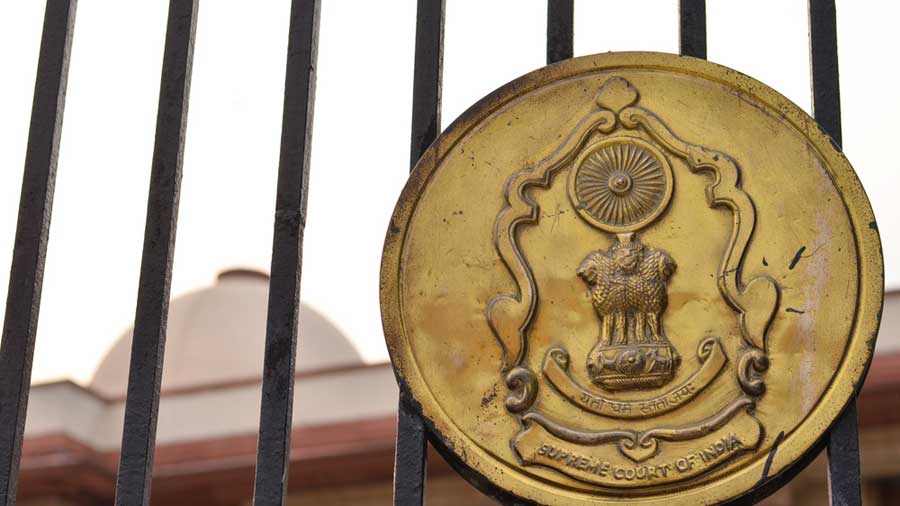The Supreme Court on Wednesday permitted the Jamiat Ulama-i-Hind to intervene in a batch of petitions challenging the anti-conversion laws in four BJP-ruled states after the organisation claimed that Muslims were being targeted through the legislation against “love jihad”.
A bench of Chief Justice of India S.A. Bobe and Justices A.S. Bopanna and V. Ramasubramanian allowed the Jamiat, an organisation of Islamic scholars, to be heard in the case after initially questioning its locus standi. The four states whose “love jihad” laws have been challenged are Uttar Pradesh, Uttarakhand, Madhya Pradesh and Himachal Pradesh.
Ejaz Maqbool, appearing for the Jamiat, said “a large number of Muslims are being harassed all across the country” and the organisation wanted to assist the court in the matter as the Jamiat espouses the cause of Muslims on various issues.
Apart from allowing the Jamiat to intervene, the bench permitted the main petitioners — advocate Vishal Thakre and the NGO Citizens for Justice and Peace, founded by Gujarat-based activist Teesta Setalvad — to implead Himachal Pradesh and Madhya Pradesh.
In their separate appeals, the petitioners had questioned the constitutional validity of the Uttar Pradesh Prohibition of Unlawful Conversion of Religion Ordinance, 2020, and the Uttarakhand Freedom of Religion Act, 2018. Subsequently, states such as Madhya Pradesh and Himachal Pradesh have also come out with their own laws to curb “love jihad”, an alleged practice according to the Right-wing to forcibly convert and indoctrinate through marriage.
Quoting media reports the Jamiat said that as on December 29, 2020, within one month of the promulgation of the ordinance, 51 people had been arrested in Uttar Pradesh alone, while 14 cases had been registered. Only two of the cases were based on complaints by the victims while the rest hinged on complaints by family members.
“At the most, the practice of converting religion just for the sake of marriage might at worst be termed as ‘ethically objectionable’ or ‘immoral’, however, the same cannot be criminalised,” the Jamiat said.
In its intervention application the Jamiat said through its legal cell secretary Gulzar Ahmed Noor Mohammed Azmi: “In such circumstances, the applicant organisation wishes to raise the issue of fundamental rights of the Muslim youth, who are being targeted and demonised by using the impugned ordinance, which in itself is unconstitutional being violative of Articles 14 (right to equality), 21 (life and liberty) and 25 (freedom of religion).”
According to the organisation, the anti-conversion laws attempt to regulate a personal decision of a person by encroaching upon an individual’s choice to convert to a religion of his or her choice and as such is a grave assault on personal liberty under Article 21 of the Constitution.
The Jamiat said the laws made conversion through “allurement” a criminal offence.
The term “allurement” has been defined in Section 2(a) of the Uttar Pradesh anti-conversion law as “…offer of any temptation in the form of: i. Any gift, gratification, easy money or material benefit either in cash or kind; ii. Employment, free education in reputed school run by any religious body; or iii. Better lifestyle, divine displeasure or otherwise.”
The Jamiat said: “As can be seen from above, the term allurement has been defined very broadly, to include even providing a gift to the person who is sought to be converted. This means if a person belonging to one religion, say Islam, gifts a non-Muslim a book concerning the teachings of Islam and the said non-Muslim person who received the book after reading it decides to convert to Islam, the said conversion could be said to have taken place by ‘allurement’ since it occurred after a gift was given to the convert.
“Further the use of the words ‘or otherwise’ makes the definition of allurement even more ambiguous and encroaches upon the right to propagate guaranteed by Article 25 of the Constitution. For instance, if a preacher simply gives a discourse about the positive tenets of his religion, which prompts anyone hearing it to convert, it would amount to illegal ‘allurement’ under the ordinance.”
However, the anti-conversion laws provide that “reconversion” to a person’s previous religion is not illegal, even if it is vitiated by fraud, force, allurement, misrepresentation and so on.
The laws put the burden on the person carrying out the conversion to prove that it is not illegal, the Jamiat pointed out. The offence of illegal conversion is also “cognisable” and “non-bailable”, which means that a police officer can arrest an accused without a warrant, and the accused may or may not be released on bail, which will be at the discretion of a court, the Jamiat said.
The effect of the laws “will be to bring a shadow of criminality over inter-faith marriages… (and) empowers disgruntled family members to slap criminal cases on couples who got married defying their diktats”, the Jamiat said.










